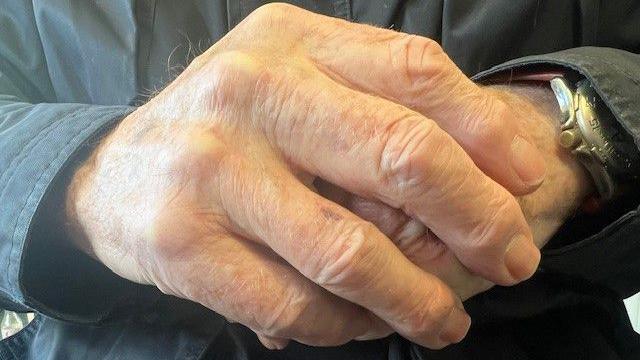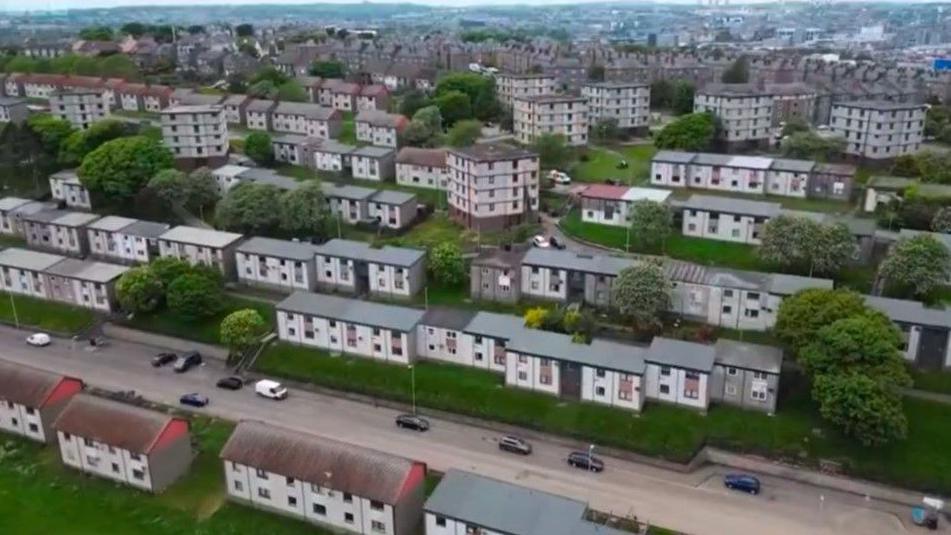'I've been offered £22,000 for Raac flat worth £60,000'

The man, in his 70s, spoke anonymously about his valuation
- Published
A "disgusted" pensioner whose flat which is set to be demolished due to potentially dangerous concrete has been offered £22,000 - well below the £60,000 he believes it is worth.
Aberdeen City Council wants to buy the 138 privately-owned homes which contain Reinforced Autoclaved Aerated Concrete (Raac).
One man, in his late 70s, used his savings to buy his one-bedroom flat in 2014 for £17,500 from the council thanks to a significant right to buy discount.
He has now been offered £20,000 plus a £2,000 disturbance fee. Aberdeen City Council said offers were being negotiated independently.
The man described the offer as "ridiculous" and said he understood that could be about a third of what similar properties were worth.
He said he will not be able to get a mortgage for a new home.
The man - who wants to remain anonymous - told BBC Scotland News he faced having to rent if he was able to find somewhere else to live.
He said he planned to stay where he was until a fairer offer was on the table.
"I have lived there for about 22 years, it's a terrific place, I like Torry," he said.
The man said he bought his home so he would not have to pay rent into his retirement.
"Everything was hunkydory but this has thrown a spanner in the works," he said.
"I will not be able to get a mortgage for another flat. It's a worry. It's been terrible.
"If I do not get a house that suits me I am not moving."
The valuation was received earlier this month.
"£20,000 is nothing, is it?" he said.

Homes in Aberdeen have been impacted by Raac
The man's daughter described the valuation offer as a "slap in the face".
She said: "He used his life savings to buy a forever home so he would not have to rent. Torry is a community.
"It was unsafe before they sold it to my dad.
"I think it's been handled really badly.
"Since this situation started, he has lost loads of weight. He feels kind of stuck and is very stressed."
Worrying time for homeowners
Aberdeen City Council said the proposed compensation package for the voluntary acquisition of privately owned properties was being negotiated by the Valuation Office Agency (VOA), an independent organisation, on its behalf.
"The discussions to date regarding market value are only being conducted with those home-owners who have given their consent. Each claim is based on its own merit and will vary on individual circumstances," a statement said.
"The council continues to hold meetings with key stakeholders and individuals and are in dialogue with representatives from both the UK and Scottish governments in regards to funding and fiscal flexibility."
The council said the VOA was following the process in accordance with statutory guidance.
Scottish government housing minister Paul McLennan said it was recognised it was a "worrying time" for homeowners affected by Raac.
"We continue to urge the UK government to make additional funding available for Raac remediation," he said.
"We continue to work closely with local authorities who can provide advice on what support may be available including advice, guidance, and information on potential sources of funding."
He said the final decision lay with the council and they would continue to work together.
What is Raac?
Raac stands for reinforced autoclaved aerated concrete.
It is a lightweight material that was used mostly in flat roofing, but also in floors and walls, between the 1950s and 1990s.
It is a cheaper alternative to standard concrete, is quicker to produce and easier to install.
It is aerated, or "bubbly" - like an Aero chocolate bar.
But it is less durable and has a lifespan of about 30 years.
Its structural behaviour differs significantly from traditional reinforced concrete.
Moreover, it is susceptible to structural failure when exposed to moisture. The bubbles can allow water to enter the material.
Raac is often coated with another material, such as bitumen on roofing panels. But this material can also degrade.
The Health and Safety Executive (HSE) said Raac is now beyond its lifespan and may "collapse with little or no notice".
Related topics
- Published13 November 2024

- Published21 October 2024

- Published19 September 2023
